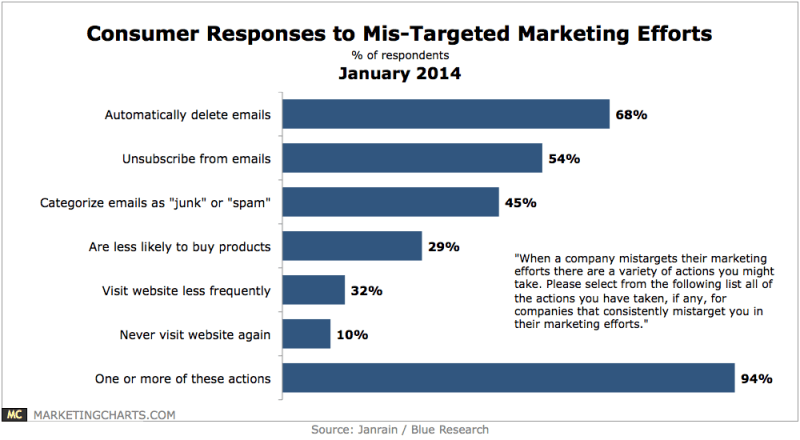Back in the “olden days” before the Internet came along marketing was pretty easy. All you had to do was produce some nice campaigns, have a rough idea of who you wanted to reach and get out there. If your marketing didn’t always reach its target, hey-ho, it didn’t matter much. After all what was the worst thing they could do? Ignore it.
Much old-fashioned marketing purported to be “targeted” but was far from it. Sure, a specific audience was identified, but within that target group there were inevitably many disinterested people. But it didn’t matter – marketing was really a case of “throw as much of it as possible and some of it will stick”.
Nowadays online you still see some of that old-fashioned marketing thinking. Companies advertise everywhere, email anyone and target search engines for almost every word on their home page. It is a case of “if we are everywhere we are bound to be seen”.
Sure, many companies do try to target their customers. They use sophisticated email marketing tools which can send specific campaigns to particular sub-groups of individuals. And web marketers can produce tightly focused landing pages to reach specific keyword-triggered interest groups. Yet, that is largely not the norm online. Still marketing on the Internet is taking something of a blunderbuss approach, even though people know in their hearts they need a targeted shot.
Failing to hit the target is nowadays a major problem for marketers, though. In those “olden days” all you could do was mildly annoy people and they would move on and forget things. But now if you miss the target they can take quick, decisive and easy action meaning that your future marketing efforts are made more difficult. For instance, they can block your future emails by listing your company as a spammer. Or they can go on to social media and diss your reputation with negative comments, making it harder for you to impact on your real market. In those “olden days” none of that could happen.
Yet worse still happens if you do not get your online marketing precisely correct, targeting the specific people interested in your product or service. Research shows that if you market people online who are not interested in what you are selling then 94% of them take “multiple actions” against you – including listing you as a spammer, unsubscribing from your mailing list and actively reducing their visits to your website, many even deciding never to visit you again.
Missing the precise target for your marketing these days is a business risk. No longer is it a minor inconvenience to a company, spending money on marketing to people who ignore it. These days, missing the target can actually be harmful to a company.
How precise is your marketing? Do you always hit the target – bulls-eye? If you don’t you are reducing your future business.


